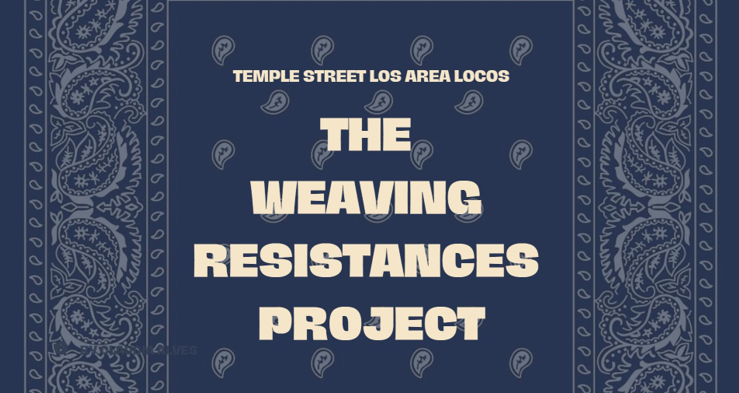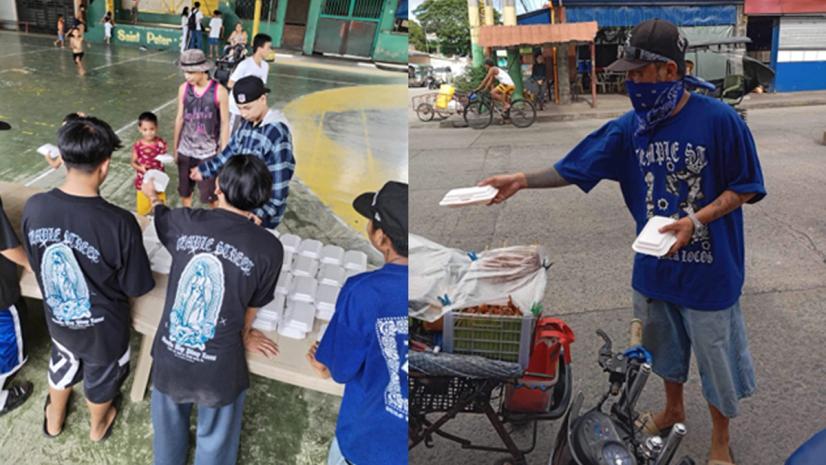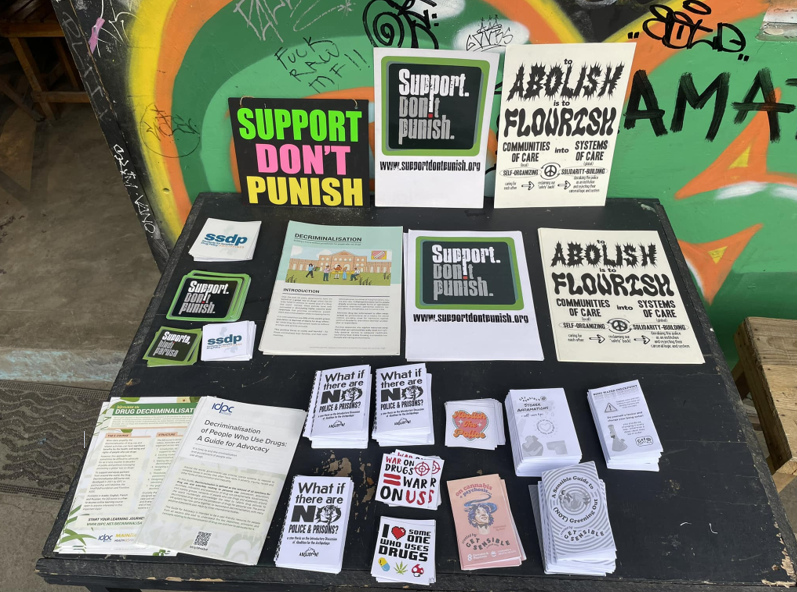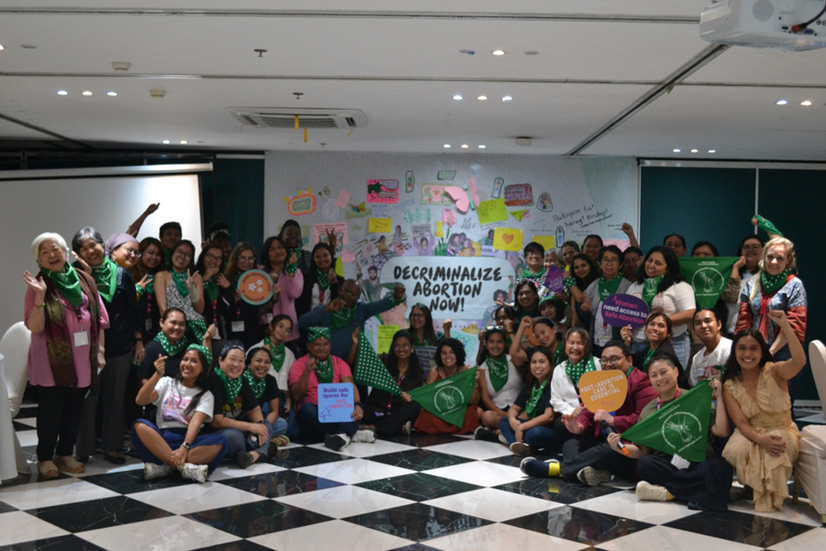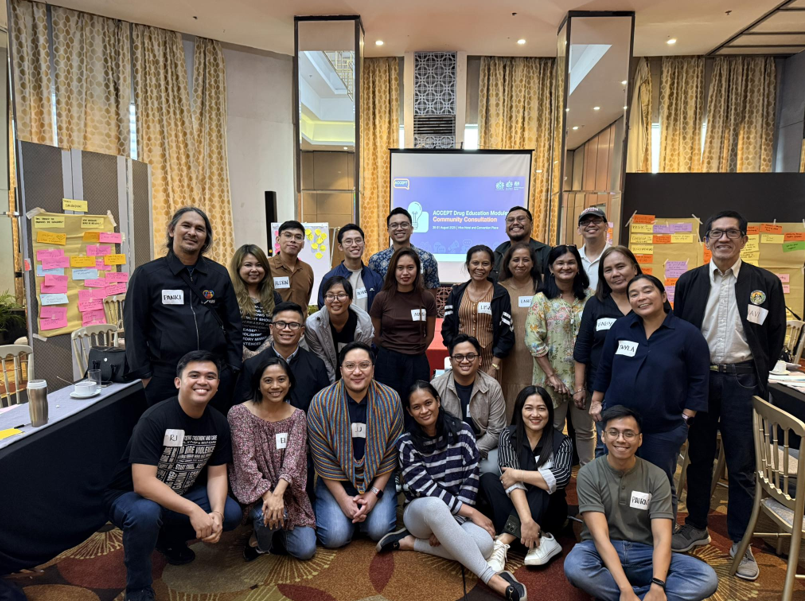Practising liberatory harm reduction: From street-level care to policy reform advocacy
In October 2023, I was awarded the “Drug Laws and Access to Justice Fellowship” by the International Drug Policy Consortium (IDPC) as part of the REFORM project, which is a regional partnership supporting people who use drugs, media, legal and civil society allies to end punitive drug laws, abusive enforcement, and stigma. The Programme supports fellows in boosting their capacity to bring about change in a region characterised by some of the most punitive policies against people who use drugs in the world — applying their legal and paralegal skills and knowledge.
But long before the fellowship, my collective — Abolisyon — has been practising care beyond the remit of the state. In Cavite, we have been running mutual aid efforts for years through survivor support, food, medical care, and accompaniment — modest but necessary acts of care and survival. In August 2023, Temple Street Los Area Locos, a local gang, reached out to us when one of their members was stabbed by a police asset for refusing to “snitch” on their peers. Later that year, that same young person was arrested on alleged drug charges, abandoned by the legal system, with no support to navigate court proceedings. Faced with this crisis, we asked ourselves: “What would it look like if we built our own systems of care, rooted in community accountability, instead of waiting for justice from institutions that only criminalise us?”
Weaving Resistances: Building safer communities by and for young people impacted by drug use and allies
Out of that question, the Weaving Resistances Project was born. It was neither a non-profit nor a “civil society” organisation, nor a program signed off by a formal agency. It was something else — something emergent.
adrienne maree brown describes emergent strategy as “fractal — small patterns that scale into the whole.” Our own small patterns took the shape of community meals, neighbourhood conversations, and music events. From these small acts of connection, we were trying to rebuild relationships within our community and scale safety. In doing so, we reclaimed and embodied the harm reduction mantra: “Nothing about us, without us, for us.” For us, this wasn’t just a slogan — it traverses our lives and survival.
Street-based youth like us are often seen as deviants or future criminals. As it happens with other scapegoated groups, narratives of essentialised ‘risk’ are weaponised against us, denying us the very possibility of ‘innocence’. Against this backdrop, sitting together over food became a transformative practice for us, a way to challenge stigma while rebuilding bonds with our neighbours, who had previously written us off. As Ruth Wilson Gilmore says, “Abolition is about presence, not absence. It’s about building life-affirming institutions.” Sharing food in community meals became one such institution — informal and fragile, but very real.
Andrea Ritchie writes, “Community accountability is not a checklist, it’s a practice of showing up for each other when harm happens and when it doesn’t.” Our meals and events were exactly that: showing up even outside of crisis, building relationships that would hold when harm inevitably occurs.
From November 2023 to March 2025, we organised community meals, music shows, film screenings, and open dialogues about drug use and sexual and reproductive health. We amplified the Support. Don’t Punish campaign, and started prisoner support networks for our friends behind bars. These weren’t just events — they were abolitionist rehearsals of a different future.
Andrea Ritchie also reminds us: “Transforming harm is not about pretending harm doesn’t exist. It’s about building the skills, practices, and conditions we need so that when harm happens, we don’t turn to police or prisons—we turn to each other.” That was the heart of our work: not escaping harm, but transforming how we respond to it.
Building a movement: SSDP Philippines
Our work rippled outward. In 2024, we founded the Philippines chapter of Students for Sensible Drug Policy (SSDP), joining a global network of young organisers fighting for humane drug policies. To launch, we mobilised two actions during the 2024 Support. Don’t Punish Global Day of Action.
Starting SSDP Philippines was about giving young people a range of places to belong — that we’re part of a global fight for justice. This is an emergent strategy in motion: starting small, moving at the speed of trust, and letting relationships guide our organising.
adrienne maree brown reminds us: “What we pay attention to grows.” By paying attention to each other, even through small acts of care, we were growing a movement.
Solidarity across movements: Toward transformative and healing justice
As we grew, we realised our struggle couldn’t be isolated from others. In 2024 and 2025, we joined events organised by the Philippine Safe Abortion Network (PINSAN) and the Women’s Global Network for Reproductive Rights (WGNRR). Their fight for reproductive justice mirrored ours — both criminalised by the state, both demanding autonomy and dignity.
This wasn’t just coalition-building. It was transformative justice — understanding that the same systems policing drugs are policing bodies, gender, and sexuality. If we want liberation, we have to dismantle all of it together.
Informality as access to justice and care
What began as “informal” acts of care has become the foundation for a broader political demand. Informality itself became a form of justice: a refusal to wait for permission to care for each other. The state has offered us violence and neglect, so we built our own systems. That’s how we survived. Now those same systems — our networks of care, our ways of looking out for each other — are shaping our fight and practice towards new, liberatory worlds.
Abolition isn’t only about ending prisons — it is about building life. As Ruth Wilson Gilmore reminds us, “Where life is precious, life is precious.” And as Andrea Ritchie writes, “Practicing new worlds is not abstract — it’s in how we cook for each other, how we respond to harm, how we create safety without punishment, every single day.” These everyday gestures are more than survival — they are blueprints for the futures we want to live in.
The fight is far from over. But the streets show us that resistance doesn’t always look like court battles or legislation. Sometimes, it looks like a meal shared among those who have targeted and criminalised identities, a network of care among the abandoned — our refusal to disappear and let others be disappeared. It is in these quiet, persistent practices of care that we reclaim life and dignity.
We carry this commitment both in our daily acts and within formal spaces of advocacy like drug policy reform in the Philippines. On July 7–8, 2025, SSDP Philippines and Cavite Side Suldados – Temple St. MBPLS took part in the Regional Dialogue on the ASEAN Work Plan on Securing Communities against Illicit Drugs 2016–2025 in Manila. Facilitated by IDPC, the dialogue brought government, civil society, and directly impacted communities into conversation about the implementation and impacts of the ASEAN Work Plan. Our presence in that space — coming from the streets, from communities often left out of regional and international policy tables — was itself an act of care and resistance, ensuring that those most affected by drug policies are never excluded from shaping them.
On August 30-31, we also joined a community consultation focused on developing the ACCEPT Drug Education Modules. Guided by a community-centred, human rights-based, and health-oriented approach, the modules aim to promote understanding, compassion, and informed conversations about substance use within the community.
We will continue building these worlds, both through our small acts of care and in our collective engagement within drug policy reform spaces in the Philippines. Our survival has always been political, and our care has always been resistance – our refusal to disappear.
Topics
Regions
Related Profiles
- Abolisyon
- Temple Street Los Area Locos
- Support. Don't Punish

